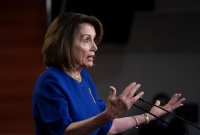Support strong Canadian climate journalism for 2025
We’ve almost forgotten about the feckless “United We Roll” truck convoy, which arrived in Ottawa and then left two weeks ago in disarray. While Canadians sympathize with the participants' concerns about jobs, their comments about climate change were startling in their childlike naivety.
The message? They believe there is no real climate crisis.
Meanwhile, the ringing admonitions of 15-year-old Greta Thunberg are still hanging in the air from her speech late last year to the COP 24 climate conference in Poland: “You are not mature enough to tell it like it is. Even that burden you leave to us children. But I don’t care about being popular. I care about climate justice and the living planet.” Thunberg went on to warn that we “cannot solve the crisis without treating it as a crisis.”
More and more, the poise and directness of children is attracting the attention of thoughtful commentators, like George Monbiot of Britain’s The Guardian, who wrote: “Before this week, I believed it was all over. I thought, given the indifference and hostility of those who govern us, and the passivity of most of my generation, that climate breakdown and ecological collapse were inevitable. Now, for the first time in years, I think we can turn them around.”
The childlike ignorance of climate change-denying adults
Standing outside the Parliament buildings in Ottawa before heading home with the ill-fated convoy, 62-year-old Pat Mavtie from Edson, Alberta, opined: “All this talk in the world right now about global warming I think is the biggest farce that we have going.” Mavtie added, “We may find out that Mr. (George) Soros and his clan have something to do with it. They’re filling their pockets on the backs of Canadian people.” Ms. Mavtie is apparently unaware that George Soros is Hungarian and lives in the United States.
Just this week, President Donald Trump doubled down on his anti-scientific and blatantly false view that climate change is "fake."
The leader of the world's foremost superpower and second most emissions-emitting country, is buying into hoaxes peddled by Fox News rather than acting on dire warnings of experts and scientists who have studied this issue for decades.
We have entered an era in which children and young people are standing up in increasing numbers and stating truths that many of their adult contemporaries, including some in positions of high responsibility and leadership, either ignore or flatly deny.
Political leaders ignore their own scientific evidence
A few weeks ago, the National Energy Board approved the expansion of the Trans Mountain pipeline. Saying the project was in the “national interest,” the NEB invoked the two-wrongs-make-a-right principle, stating that although the expansion will cause environmental harms to B.C.’s coastal ecosystem, these coastal waters are already degraded. The approval launched a wave of protest from scientists, environmental advocates and Indigenous leaders.
Building the Trans Mountain expansion would prolong our dependence on fossil fuels, which will intensify climate instability. Canada’s federal scientists already know the damage this will cause.
Just check out the Government of Canada website where you can read about “Canada’s top 10 weather stories of 2018,” and find the following:
“Scientists from Environment and Climate Change Canada have concluded that the risk of Western fires since 2015 has increased two to six times due to human-induced warming and that, in the Arctic, extreme sea-ice minima in recent years would have been extremely unlikely in the absence of human influences. In fact, scientists have made a clear link between climate change and extreme weather events that include heatwaves, wildfires, flooding and see ice disappearance.”
More adults behaving badly
The Alberta truckers who arrived in Ottawa drew a number of disruptive adults to their ranks, including a corrupted version of the French "yellow vest" protest movement. They became, as noted by Nora Loreto in the Washington Post, “a far-right gathering space, acting as an umbrella for renegades and misfits” who support Canada’s extractive industries. Mixed in with their pro-pipeline worker slogans are signs against "globalism" and the U.N. Global Compact for Migration.
Faith Goldy, a controversial figure who went to school at the exclusive Havergal College (tuition fees between $30,000 and $60,000 a year, with an additional one-time registration fee of $7,500-$8,500), and gave sympathetic reports of the white supremacist Charlottesville rally in 2017, was on stage in Ottawa at the rally, shouting about "open borders" and "illegals."
Federal Conservative leader Andrew Scheer was on hand too, acting as if global warming was nonexistent, as was People’s Party of Canada founder Maxime Bernier. In a tweet, Scheer stated clearly that “Canadian energy workers deserve a government to supports their industry and champions it worldwide.” Scheer promised to do away with the federal carbon tax and weaken environmental assessments if elected.
More youth behaving sensibly
But while some adult Canadians are behaving in ways that might make their mothers cringe (especially if she had a science background), a growing number of children and youth are showing insight and maturity far beyond their years. They are facing up to the primal threat of climate change, even if society's adult leaders can’t bring themselves to admit how grave this threat really is. And they are facing down the adults who threaten their future.
Inspired by Greta Thunberg, a group called “Fridays for Future” has formed, and over the last six or seven months, staged student walkouts on Fridays throughout northern Europe and in Japan, Switzerland, Austria, Australia, Britain, the U.S. and Canada. This year students in Uganda, Colombia, New Zealand and many other countries have followed suit.
In Britain, so compelling has been the impact of this movement that after some initial prevarication, first a number of teachers joined the strike actions by their pupils, and then the teachers and environmental experts joined together to offer street classes in environmental science and political activism.
In Canada and the U.S., a group called Powershift, created in 2016 from the Energy Action Coalition, has been staging training events for young people to learn practical ways to advocate for climate justice and action. The most recent Canadian event was held in Ottawa February 14-18, and was attended by over 400 youth from all over the country, including many from Indigenous communities.
And this Friday, on March 15, youth plan to hold a school strike in nearly 1,000 cities and towns in at least 82 countries around the world, inspired by Thunberg's climate activism.
The U.S., faced with the retrograde phenomenon that is Donald Trump, has become a hotbed of youth activism.
The group Zero Hour, started in Seattle by 16-year-old Jamie Margolin, has mobilized youth in 25 cities across the nation to pressure federal representatives to divest from fossil fuel corporations and stop accepting donations from corporations “that destroy the planet and our environment.” She also joined with 12 other youth and sued the government of Washington State for not protecting the environment. They lost their case, even though state law acknowledges each person has a fundamental and inalienable right to a healthful environment.”
But a similar youth-led case suing the U.S. federal government for the same reasons is faring better. The Juliana v. United States case is backed by two organizations, Our Children’s Trust and Earth Guardians. The legal process is moving slowly through the court system, successfully fending off repeated and aggressive legal challenges from the Trump government (five to date). The appellants are now going on the offensive themselves, asking on February 8, 2019, for a court order to prevent new leases and permits for coal and oil exploration, extraction and infrastructure.
The 18-year-old youth director for Earth Guardians, Xiuhtezcatl Martinez, has been public speaking since age six, and has won numerous national and international awards for his work.
And then there’s the Sunrise Movement, about which began in 2017 in the U.S. Northeast, but is now a nation-wide organization “building an army of young people to make climate change an urgent priority across America.” It was started by two friends in their twenties — Sara Blazevic, whose extended family back in Croatia was hugely affected by flooding (worsened by climate change) and Varshini Prakash, a Philadelphian of East Indian parentage.
The Sunrise Movement is a major force behind the Green New Deal, now being championed by congresswoman Alexandria Ocasio-Cortez, in part because its founders had been trained by an advocacy training institute called Momentum.

Nothing illustrates the power of this new youth-centred movement for change than the recent discussion between veteran Democract Dianne Feinstein and a group of young Sunrise Movement members. Feinstein, despite her impressive credentials, often came across as preachy and stiff, struggling to deal with this new and forceful presence.
Canadian youth have also embraced the movement towards climate sanity. The Quebec youth group Environnement Jeunesse, led by its Executive Director Catherine Gauthier, launched a legal action against the federal government last November, stating: “…the Canadian government has decided to protect the oil industry rather than the future of children and younger generations.” The group’s application for a class action suit is being sought on behalf of all Quebec residents under age 35.
On an international scale, and in a more traditional fashion, the UN Environment Program has established a “Young Champions of the Earth” contest, in which seven prize-winners in their twenties from all over the world receive substantial seed money and funds for communication, as well as mentoring and training in entrepreneurship and advocacy. Another 50 youth will receive technical and professional advice from a community of experts to help them become the “next generation of environmental leaders.”
Youth are displaying maturity about more than climate change
On many social issues beyond climate change, young people have organized to find solutions.
Toronto native and filmmaker Kasha Sequoia Slavner, already a peace activist when she was only 16, traveled for six months across seven countries with her mother, gathering footage for what became the award-winning film The Sunrise Storyteller, documenting examples of resilience that “serve as a beacon of hope for others to take action.” Her film has been shown in more than 55 festivals around the world and won 28 awards.
South of the border again, the United We Dream organization fights for justice for immigrants, reaching out to 400,000 members and another four million supporters.
And the powerful new movement in favour of stricter gun laws in the U.S., called Never Again MSD, an outgrowth of the March for our Lives that took place after the murders at Stoneman Douglas High School in Parkland, Florida on February 14, 2018, has become a force to reckon with in the struggle to rationalize the pernicious use of firearms in the U.S.. The group has already caused the State of Florida to implement, in March, 2018, the first restrictions on gun use and availability in that state in 30 years.
The generation gap is widening in unusual ways
What is now clear is that the upcoming generations who will be most affected by processes destabilizing global equilibrium — including the gross imbalance in material security between haves and have-nots — are no long content to sit back and let an anachronistic, unfair and illegitimate status quo ante continue untouched. The numbers of young people speaking up, their eloquence and self-assurance, and their clear grasp of the goals they seek, no matter how expansive, are changing the face and vocabulary of global discourse, one burst of activism at a time.
The gap couldn’t be wider between the rancorous and disconnected adults who support a fading “sunset” industry, and the bright, enthusiastic and skilled youth who embrace the tough and ineluctable truths of the 21st century and are working to mitigate future harms.
Today's youth will work in concert with any of us from previous generations who also sense the looming confrontation between world views that they discern so clearly. They will reshape the culture of humanity so that we can once again live lightly on the earth.
For more information on the March 15 climate rally near you in Canada, see here.






Comments
Bloody 'ell. Adults to the front, please.
Quote: "On climate change, children behave like adults while adults show immaturity."
Hear, hear!
I could make a parallel statement about certain other subject areas, as follows:
"On jobs, unemployment and behaviours towards whistleblowers, children behave like adults - while adults show immaturity, willfull ignorance and bigotry."